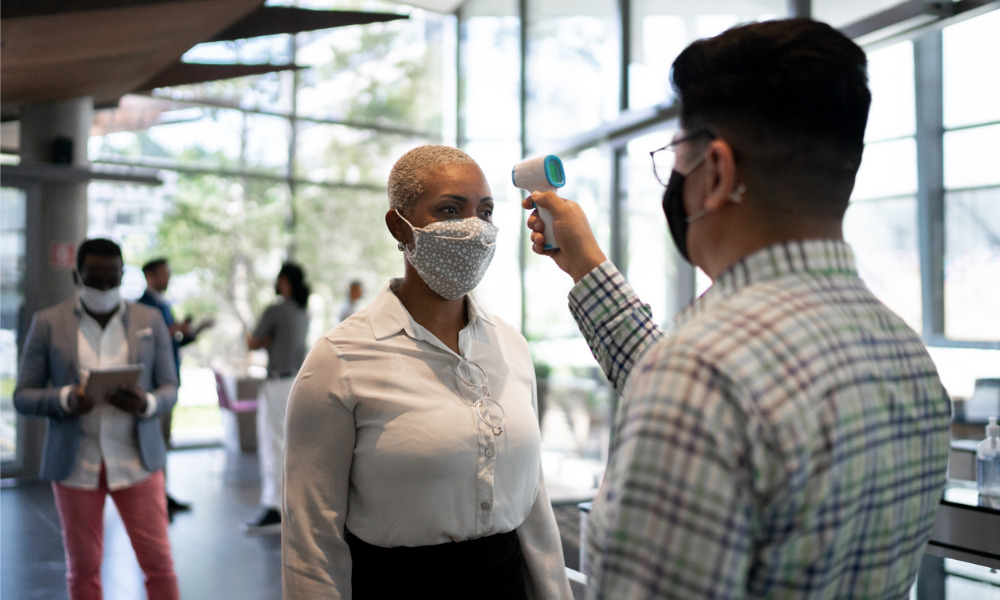
The pandemic is creating a new legal battleground where employers must tread carefully

Employers worldwide are bracing for a new wave of lawsuits over their health and safety obligations towards workers who catch COVID-19 on the job.
One of the earliest complaints – filed against a major retailer in the US – has become a landmark.
The family of a maintenance employee who died of coronavirus complications alleged his managers knew about his condition but simply sent him home. Two days later, the worker died.
The family accused the employer of failing to implement proper sanitation and social distancing protocols; issue protective gear to employees; and inform them about positive cases at work.
Other essential workers – particularly, medical frontliners – are risking life and limb on the job. At least 7,000 healthcare workers worldwide have died from COVID-19, according to data released last week by Amnesty International.
“It is a scandal that so many are paying the ultimate price,” said Steve Cockburn, head of economic and social justice at the human rights group. Many months into the pandemic, he said, they are still “dying at horrific rates.”
READ MORE: Is it too dangerous to bring staff back to the office?
On the legal front, COVID-19 is creating a new battleground where employers must tread carefully.
In Australia, unions and lawyers advocating for frontliners in the locked-down state of Victoria are urging Workplace Safety Minister Jill Hennessy to declare COVID-19 a workplace injury, especially since contact in certain lines of work increases an employee’s risk of catching the virus.
The move aims to give workers more options to seek redress and be automatically compensated after being infected. To date, COVID-positive employees may – on a case-by-case basis – be covered by workers’ compensation if:
Safe Work Australia believes, however, that it would be challenging for most employees to establish the time and place they were infected and thus connect the incident to their employment. But in some industries, such as health care, it would be easier to do so.
Employees must therefore prove their illness was related to work, whether as a result of having travelled to a place where there was an outbreak or through interaction with people on site, such as colleagues, clients, customers or patients.
“Your workers’ compensation authority will determine whether you are covered by their scheme and if the contraction of COVID-19 was adequately connected to their employment,” the agency said. “They will consider each claim on its merits, with regard to the individual circumstances and evidence.”
READ MORE: COVID-19: Can an employee sue for catching the virus at work?
Employer’s liability
The workers’ comp systems in other countries also provide limited details on how to address the spread of contagious disease.
At this point in the crisis, simply being exposed to the risk of COVID-19 isn’t grounds for a worker to sue their employer, said Stuart Rudner, founder of Canadian employment law firm Rudner Law.
“But they can raise a claim based upon actual damage,” he told HRD.
“If the employee becomes sick and suffers any kind of damage or loss, then they could look at raising a legitimate claim. In most cases, however, businesses are covered by Workplace Safety Insurance or Workers’ Compensation, depending on which province you operate in,” Rudner said.
Over in the US, lawmakers are taking a closer look at how much liability businesses really have in the event of an outbreak involving their workers.
But on a state level, a number of governors have already expanded coverage to include healthcare workers and first responders’ COVID-related claims in their state workers’ comp laws.
California, for one, has made more inclusive changes. An executive order allows employees who worked outside their homes to file claims for COVID-related illnesses within a given period since these would be “presumed to arise out of and in the course of the employment”.
Overall, declaring COVID-19 a workplace injury may serve to minimise employers’ risk against lawsuit.
“Provided that the employers have complied with their obligations to provide a safe workplace, state workers’ compensation laws may protect some employers from liability to employees if COVID-19 is covered under the applicable state workers’ compensation statute,” advised employment lawyer Tal Marnin and associates from the New York law firm White & Case.
A few companies have also considered the use of waivers but, as the legal experts warn, these won’t necessarily limit employers’ COVID-19 liabilities.
“Such waivers will not protect employers from liability for, among other things, gross negligence or wilful or intentional misconduct including in connection with the employer’s obligations to provide and maintain a safe workplace,” they said.
These agreements also won’t absolve employers when facing complaints before the Occupational Safety and Health Administration.
Only a minority 8% of employers in a recent study, however, said they required workers to sign liability waivers before returning to the workplace.
“The enforceability of these type of waivers is likely to be fact-specific and state-specific, but under established law most courts will not enforce waivers that violate public policy and will consider the parties’ respective bargaining power,” said Blank Rome, which led the study.